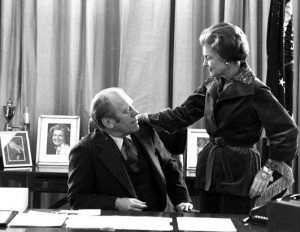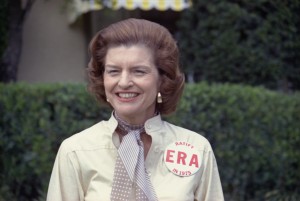 It speaks volumes about the impact Betty Ford had on politics in America that her death on Friday evoked almost as much outpouring of sympathy and eulogies as her husband’s did five years ago (December 27, 2006)
It speaks volumes about the impact Betty Ford had on politics in America that her death on Friday evoked almost as much outpouring of sympathy and eulogies as her husband’s did five years ago (December 27, 2006)
As our nation’s first lady, she was a powerful advocate for women’s health and women’s rights. After leaving the White House, Mrs. Ford helped reduce the social stigma surrounding addiction and inspired thousands to seek much-needed treatment.
(President Barack Obama, PBS, July 8, 2011)
No doubt it was her very public battle with and triumph over her addiction to prescription drugs and alcohol that endeared her to most Americans. But she sealed her legacy by co-founding the Betty Ford Center in 1982, a world-renowned clinic for the treatment of substance abuse that is based on her own treatment and rehabilitation.
Never mind that most people now know it as the place where celebrities like Elizabeth Taylor, Ozzy Osborne, Robert Downey Jr, and Lindsay Lohan go more to rehabilitate their reputations than to be treated for their addictions.
 But my tribute to her stems from the pioneering way she used her platform as first lady to speak as openly, honestly and progressively about women’s rights and abortion rights as she did about pre-marital sex and smoking pot.
But my tribute to her stems from the pioneering way she used her platform as first lady to speak as openly, honestly and progressively about women’s rights and abortion rights as she did about pre-marital sex and smoking pot.
Perhaps it was unusual for a first lady to be as outspoken about issues as I was, but that was my temperament, and I believed in it.
(Betty Ford, Washington Post, July 10, 2011)
In fact, it’s an indication of how far in the vanguard of the feminist movement Mrs. Ford was that Nancy Reagan, who succeeded her as the next Republican first lady in 1980, seemed like a stepford wife when she used her platform to advance traditional causes like encouraging abstinence from drugs and sex (remember “Just Say No”?) and updating the White House china.
Like her husband who died at the enviable age of 93, she too was 93.
Farewell, Betty.
Related commentaries:
Former president Gerald Ford is dead